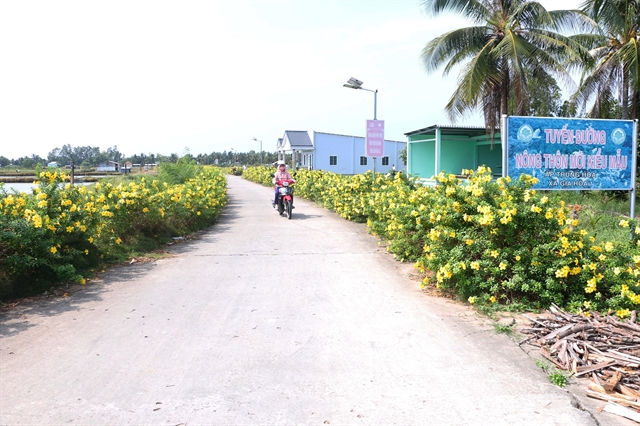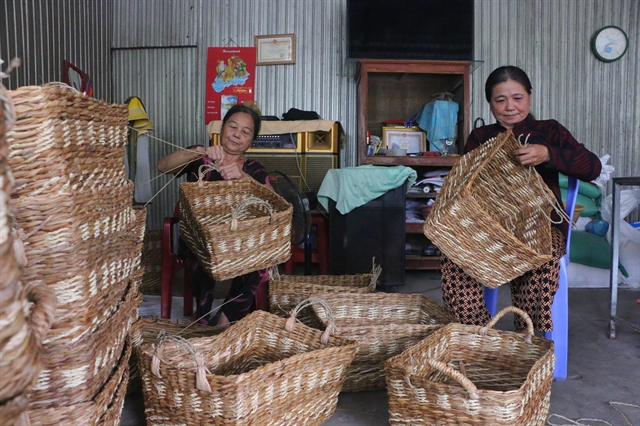
|
| A clean and beautiful road in Trung Hòa Village, Gia Hòa 1 Commune, Mỹ Xuyên District in Sóc Trăng Province. — VNA/VNS Photos Minh Hưng |
HCM CITY — New rural area construction in the Mekong Delta has gained remarkable results, affirming the correct guidelines and policies of the Party and State on agricultural and countryside development.
New roads
Walking on a 1.5-km road that won the first prize in the contest “New model rural roads in Sóc Trăng Province 2022”, Trương Văn Khởi, 70, was filled with joy.
Khởi, who lives in Trung Hòa Village, Gia Hòa 1 Commune, Mỹ Xuyên District, said that local people were very excited when the road was widened. Flowers were planted on both sides. Lights were installed to use in the evening, helping to make the village beautiful.
With the new road, children going to school and everyone’s travel is more convenient.
He said that at first, some households wondered whether a new road should be built or not.
As explained by commune officials, everyone understood that paving the way means opening a new direction for people’s lives.
Khởi’s family voluntarily donated 1,000sq.m of land and VNĐ2 million (US$80) to expand the road.
Permanent Deputy Secretary of the Party Committee and also Chairman of the Gia Hòa 1 People’s Council Võ Văn Đào affirmed that local authorities educated people to understand that with rural construction, the people’s material and spiritual lives would be improved.
In Kiên Giang Province, Tân Hiệp District is the first district to meet new rural standards. Creating consensus and calling for people’s energy were solutions that the district implemented.
Phạm Văn Tâm, from Tân Hiệp A Commune, Tân Hiệp District, said that in 2022, many roads did not have lights, which caused a number of traffic accidents.
Local authorities asked for cooperation from residents. With the spirit of solidarity and consensus, local people contributed over VNĐ300 million ($12,200) to build a new lighting system and 20 cameras to monitor security and order.
Higher income
With both hands deftly weaving handbags from bamboo grass, Trần Thị Tươi and Nguyễn Thị Vẹn, said that their hometown had changed a lot.
The two women, from Mỹ Tây A Village, Mỹ Quới Commune, Ngã Năm Town in Sóc Trăng Province, said that many local women had the profession of weaving handicrafts from plants and grass.
Their products were sold to a cooperative for export.
On average, each person earns VNĐ150,000-200,000 ($6-8) per day.
Representative of the MCF Mỹ Quới Cooperative Lê Thị Hồng Lan said that the cooperative specialised in producing handicraft items woven from grass – a local environmentally friendly plant.
Each month, the cooperative exports about 8,000 products of all kinds to the US, Canada and Australia, creating jobs for about 400 local workers.

|
| Residents earn stable incomes weaving handbags in Mỹ Tây A Village, Mỹ Quới Commune in Ngã Năm Town. |
Thạnh Hưng Commune, Giồng Riềng District in Kiên Giang Province increased people’s income by restructuring the agricultural sector, forming production chains with high value and developing one commune one product (OCOP) products.
To date, the commune has three OCOP products including Mạnh Tài rice papers, seedless lemon and Hoa Hải Đường wine.
The average income of people in the commune reaches over VNĐ64.5 million ($2,600) per person per year.
Standing in a fruit-laden lemon grove, Nguyễn Thị Quyến, owner of the 5,200-square metre orchard, said happily that the over 300 trees can be harvested all year round.
At a maximum, she can harvest up to 100kg of fresh lemons in a day.
On average, each year Quyến’s family earns over VNĐ180 million ($7,300).
With the commune’s care, Quyến twice received loans from the Bank for Social Policies and the Farmers Support Fund to expand her production.
Building cultural life
Secretary of Gò Quao District Party Committee of Kiên Giang Province Trần Thanh Việt said that as a remote district, the locality always took care of the people’s material and spiritual lives, creating comprehensive development.
As many as 34 per cent of the district’s residents are Khmer people.
Their traditional cultural values are always preserved and promoted.
Last year, the Khmer Culture, Sports and Tourism Festival was held with diverse activities, promoting the unique culture of ethnic groups.
Chairwoman of the Đại Tâm Commune Fatherland Front in Mỹ Xuyên District, Sóc Trăng Province Lâm Thị Thanh Trúc said that to build new rural areas, the commune chose culture – tourism to implement.
With typical tourism site the Chén Kiểu Pagoda, a Khmer pagoda with unique architecture decorated with elaborate bowls and plates, each year over 200,000 domestic and foreign visitors come to the commune to admire the famous pagoda and learn about traditional Khmer culture.
Three ethnic groups of Kinh, Khmer and Hoa are now living in solidarity in Đại Tâm Commune with many cultural features, creating diversity and richness in local cultural identity.
Notably, Khmer traditional festivals such as Chol-Chnam-Thmay, Sen Dolta and Ok-Om-Bok are always held.
Also in Sóc Trăng Province, the National Intangible Cultural Heritage – traditional pía cake making in Phú Tâm, Thuận Hòa and An Hiệp communes in Châu Thành District is a unique cultural feature.
It connects culture with economic development and building new rural areas.
Chairman of the district Fatherland Front Bùi Mỹ Thuận said that the authorities always created favourable conditions for localities with heritages to promote their values, considering it as their strength.
Currently, pía cake making establishments in the district create regular jobs for about 1,400 workers, increase people’s income, and practically promote cultural values towards comprehensive development.
Synergy
By the end of last year, Kiên Giang Province had 110 out of 116 communes recognised to meet new rural standards, of which 19 communes meet advanced new rural standards, according to the provincial New Rural Coordination Office.
The province strives that by next year, all of 116 communes will meet new rural standards, of which 55 communes will achieve advanced new rural areas.
Standing Deputy Chairman of the provincial Fatherland Front Committee Ngô Phương Vũ said that the Fatherland Front at all levels and concerned organisations would widely educate the people about policies on building new rural areas.
Focusing on innovative solutions to educate locals, Chairwoman of the Tân Hiệp District Fatherland Front Committee in Kiên Giang Province Nguyễn Minh Ngọc said that the district promoted digital transformation in its work.
Different forms of education through Zalo groups and fanpages about typical models, good people, good deeds, information related to socio-economic development, ensuring security and order, and local major events have attracted a large number of officials, Party members and people.
Through digital transformation in education, the district Fatherland Front Committee promptly understand people’s thoughts and aspirations, answers their questions about policies and provides timely support to them.
The district uses application on the internet platform associated with QR code scanning to build two education models.
One of them is the information page “Tân Hiệp Solidarity – Book Library 4.0”, giving information about the Party’s guidelines and policies, the State’s laws, socio-economic development activities and new rural construction in the district.
Another model is “Hồ Chí Minh Cultural Space 4.0” giving contents about late President Hồ Chí Minh’s ideology, ethics and lifestyle.
From a grassroots-level perspective, Standing Deputy Secretary of the Gia Hòa 1 Commune Party Committee in Mỹ Xuyên District, Sóc Trăng Province Võ Văn Đào said that building new rural areas was a long journey with no stopping stations.
“No one else but the people are both the implementers and beneficiaries of the new rural areas,” he said.
Therefore, the right policies and guidelines so that the people can understand, have high consensus and join efforts, are an important foundation for building new rural areas and continuing to achieve higher results in Gia Hòa 1 Commune. — VNS
- Reduce Hair Loss with PURA D’OR Gold Label Shampoo
- Castor Oil Has Made a “Huge” Difference With Hair and Brow Growth
- Excessive hair loss in men: Signs of illness that cannot be subjective
- Dịch Vụ SEO Website ở Los Angeles, CA: đưa trang web doanh nghiệp bạn lên top Google
- Nails Salon Sierra Madre
 VnExpress News The News Gateway of Vietnam
VnExpress News The News Gateway of Vietnam





